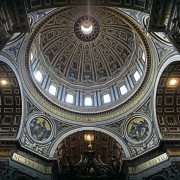The Two Kingdoms
I’m sure to most Christians, this title will evoke thoughts of the kingdom of God versus the kingdom of darkness. Well, you have every right to. However, my thoughts today are not focused on a comparison of those two, much us they do exist in the Christian conversation. Today, my focus is on the kingdom coming and the kingdom come, because in as much as we do mention the coming kingdom in our discourse, there seems very little mention of the kingdom come, and it’s effects on our lives, attitudes and actions.
The Gospels do make use of the phrase “Kingdom of God” and “Kingdom of Heaven” very often (in fact over 50 times), but have we ever stopped to ask what exactly it is, and what it meant to those in Jesus Christ’s day? Today you hardly hear a message from the pulpit about this kingdom, yet the Gospels are full of Jesus saying “the kingdom of heaven is at hand”. Secondly, Jesus does inform us that his kingdom is not only a far away reality, but one in which we now live in as a result of his coming onto the earth – “The kingdom of God cometh not with observation: Neither shall they say, Lo here! or, lo there! for, behold, the kingdom of God is within you”.Luke 17:20-21 (KJV). I prefer “among you” rather, but then I digress.
One of the clear statements about the kingdom come (not the future “kingdom coming”) is recorded in Luke 4:16. After Jesus has been presented with a scroll of Isaiah the prophet in a Nazarene synagogue, he proceeds to read from what we now know as Isaiah 61.
“The Spirit of the Lord is on me, because he has anointed me to preach good news to the poor. He has sent me to proclaim freedom for the prisoners and recovery of sight for the blind, to release the oppressed, to proclaim the year of the Lord’s favour.” (Luke 4:18-19 NIV).
He then proceeds to say that this prophecy is fulfilled in him. Isaiah 61 has always been considered a Messianic prophecy, speaking of what the Messiah will do when he establishes his kingdom. Therefore once Jesus read that and says that “Today this scripture is fulfilled in your hearing”, he was without doubt stating the claim that he was the Messiah, though he didn’t say it directly. And if that was so, then the kingdom of the Messiah prophesied by the prophets was not just a future realization, but a real thing now. No wonder the people were amazed – because the hope of their fathers is about to be fulfilled in their age.
And trust me, the people were truly waiting for a Messiah, for most of them were quite despondent. They had just returned some centuries back from exile, and weren’t being ruled again by the house of David any more, but by all kinds of other leaders – from the Hasmonean dynasty (from the Judas Maccabeus lineage) to the Herodian one (King Herod, Herod Agrippa etc), both of which were at least Jewish; to being directly ruled by Roman appointees like Pontius Pilate. Their High Priest was no longer from the family of Zadok in the tribe of Levi as was always the case historically, but now could be any person who could pay the highest bribe to the current political leader.
And their Roman rulers were exacting quite a heavy toll on them. Apart from having to pay their normal temple tax i.e. tithe (which in those days was more than the 10% we have come to accept today, but rather closer to 23%), they were now also supposed to pay tax to the Romans (hence tax collectors like Zaccheus and Levi). And the religious fundamentalists, referred to as the Zealots, who felt that it was unlawful for God’s people to be ruled by Gentiles, and for them to be paying taxes to them and the like, were continuously formenting trouble by violently attacking Roman installations and symbols of Roman rule, as well as anyone of the leaders of the Jews who they felt were predisposed to Roman manipulation. Barrabas who was exchanged for Jesus Christ is a typical example.
This and a whole lot more meant that a lot of people were looking forward to someone who could come and break the chains of bondage that Rome had put on them, and set them free. They were looking for a political solution, and really looked to the old days of the David and Solomon etc. as the golden days. In this light then, indeed they could not have understood Jesus in any other way.
And yet the most striking part about Jesus claiming of Isaiah 61 is his stopping short of the rest of the v 2, specifically “and the day of vengeance of our God”. To most people, without an exacting of “the vengeance of our God”, there was no way the current political situation of slavery to Rome will change. But Jesus didn’t go in that direction, for he came this time to achieve something, and that must be achieved in this dispensation. He never said the day of vengeance of God will not come, but rather that he had come not to exact judgement, but to extend mercy. This is exactly what the beginning of Isaiah 61 dealt with, but since they were more interested in a political solution involving the removal of Roman rule, the Jews rejected him and crucified him.
But I will not dwell on their rejection, neither will I dwell on the kingdom that is to come in which the vengeance will be exacted, but I will dwell on the Kingdom Come, the Kingdom Now. For it is entirely possible (as is evident throughout history to date in all nations) for a people to live in sovereignty, but still be plagued with the effects of sin. The question then is what is the nature of the Kingdom Now? Who is a part of the Kingdom Now and what effect should it have on it’s participants?
One of the cardinal requirements of the OT which unfortunately most Israelites were reluctant to apply for very obvious reasons was the Jubilee. Every 7 years, Israelites were to leave the land fallow for it to regenerate. After 7 cycles of such 7 years i.e. 49 years, the 50th year should be declared a year of liberty, a Jubilee (Lev 25). No farming was to be done, every Jew sold into slavery was to be freed and all land sold to another person as a result of poverty and need was to be returned. This was to afford the people a chance to start again, and in that vain was truly called a year of liberty. See Unger’s Bible Dictionary on Jubilee:
“It would seem that there must have been a perfect remission of all debts in the year of Jubilee from the fact that all persons who were in bondage for debt, as well as all landed property of debtors, were freely returned. Thus the Jubilee year become one of freedom and grace for all suffering, bringing not only redemption to the captive and deliverance from want to the poor, but also release to the congregation of the Lord form the sore labour of the earth, and representing the time of refreshing (Ac 3:19) which the Lord provides for his people. For in this year every kind of oppression was to cease and every member of the covenant people find his Redeemer in the Lord, who brings him back to his possession and family.” (Festivals, Jubilee, pp 352, Unger’s Bible Dictionary)
It is evident from the above that the prophet Isaiah had the restoration of the Jubilee in mind in the 61st chapter of his prophecies, and Jesus wouldn’t have disappointed in re-quoting him. Evidence of the fact that Jesus had the same thing in mind is expounded in the Lord’s prayer, which when properly interpreted, should read:
“Remit us our debts, as we ourselves have also remitted them to our debtors”(Matt 6:12)
and not the “spiritualized” version that we were taught in Sunday school referring to “sins” instead.
“Forgive us our sins, as we forgive those who sin against us”
Note that all of these requirements of the Jubilee were not to be implemented by God, but by the people themselves. God wasn’t going to work a miracle to set the enslaved Israelite free or get back the poor man’s land for him. The requirement was enshrined in the law that they obey. Therefore the poor, the captive and the heartbroken would receive their release based on the willingness of their fellow brethren to adhere to this set down law.
It is noted by OT and NT historians alike that this was one of the most difficult practices for the people of Israel, especially for the well-to-do. In fact, many people just ignored it, and some tried to create loop holes in the law to escape canceling debts owed or releasing land back to their owners. We could go into how they achieved these except that time and space will not allow us to. But the point is moot that such observance was very minimal as the years went by. No wonder then that people (including the prophet Isaiah himself) expected that in that Messianic kingdom, this Messiah will enforce the observance of these laws, bringing freedom to the poor, captive and destitute.
I posit and believe you will agree with me the notion that the Kingdom Now is experienced in the body of Christ – his church. The question that lies before us then is that if we do claim to be living in the Kingdom Come, whiles we wait for the Kingdom Coming, how far have we gone in our practice of the Kingdom Come’s requirements?
For it is within the church that the poor are able to live out the good news – where they are counted worthy of participation in the riches of the kingdom which the king has placed at the disposal of the rich amongst them. It is within the church that the broken hearted receive strength endued from the Son to know that they are also loved and cherished no matter where they have been and what they’ve done before coming to him. And I’m not talking about the individual feeling that Jesus loves them alone, but also that they are in a community of people who love them as much as Christ does. It is within the church that captives and prisoners are integrated into a community of brethren who open their doors and their lives to them, instead of treating them like castaways. It is within the church that the healing power of Jesus Christ is experienced, when all hope is lost. It is within the church that the class barriers and elitism is broken, not built up and entrenched.
And then to my favourite part of Christ’s radical declaration: It is in the church that the year of the Lord’s favour can be truly experienced. I know what some of my friends think with any whiff of reference to “the Lord’s favour”, but it is very evident here that the year of the Lord’s favour is not about the individualistic name-it-claim-it that we are used to. In fact, it is quite socially radical than our own myopic personal circumstances lead us to dwell upon.
Maybe it’s time we begin to think of how Jesus intends we fulfil his kingdom that is amongst us. Maybe it’s time we put our money where our mouths are and create systems that liberate, not enslave men and women who belong to Christ. Just like the Jubilee, God is not going to do a miracle to have his kingdom established amongst us. We have to accept the guidance of his word and Spirit, as it leads us into self-sacrifice and servanthood for the advancement of each other in fulfilling the purpose that Christ himself has already said – “Today this scripture is fulfilled in your hearing”. It requires a change in our attitudes, priorities, desires and wishes. So, any pundits for the Kingdom Come?










Leave a Reply
Want to join the discussion?Feel free to contribute!